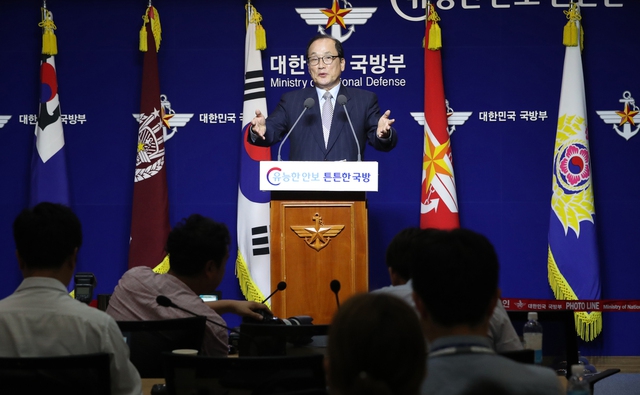Posted on : Aug.3,2018 17:57 KST
 |
|
Jang Young-dal, chairman of the Defense Security Council (DSC) reform committee, speaks at a press briefing at the Ministry of National Defense regarding various opinions on how to reform the DSC on Aug. 2. (Park Jong-shik, staff photographer)
|
The Defense Security Command (DSC) compiled and subsequently deleted files on “preparations for martial law implementation” during candlelight demonstrations in early 2017, it was learned on Aug. 2.
The Ministry of National Defense’s DSC reform committee also submitted a reform plan to the ministry that included cuts of over 30 percent to DSC staffing and full-scale organizational changes.
A special investigation team for the DSC allegations released a document the same day announcing that “evidence has been detected of the storing and details of hundreds of files on the USB devices” where DSC martial law-related files were originally contained, adding that “many of them have been restored.”
“Noting that much of the content in the restored files concerns preparations for martial law implementation, we are focusing our investigative capabilities on verifying the facts based on analysis of confiscated materials and statements by the relevant parties,” it added. The announcement is drawing attention as providing concrete circumstantial evidence that DSC martial law documents were prepared in anticipation of the actual implementation of martial law.
The investigation team also addressed the issue of the martial law document’s original title, which it said had been “established to be ‘Preparation Plan for the Current State of Affairs,’ not ‘Wartime Martial Law and Joint Action Plan’ as has been reported in the press.”
The investigation team also reported that personnel orders, budgets, and other locations were established under the name “future anti-espionage duty development plan task force” to allow the DSC to operate the martial law drafting task force secretly, with personal computers separated from the internet used to draft documents, while the electromagnetic devices used were ordered formatted to prevent recovery after the task force had finished operating.
Meanwhile, the DSC reform committee, which was launched as a Ministry of National Defense advisory body for DSC reforms, released a recommendation the same day including sweeping reforms to the DSC’s organization and nomenclature.
“Our committee plans to abolish the legal and institutional devices currently underpinning the DSC, including the DSC decree, and create new ones in their place,” committee chairman Jang Young-dal explained in a press briefing that day.
At the same time, Jang added, “No final decision on has been made on whether the new unit will carry on the DSC’s current form, become an advisory agency for the Minister of National Defense, or be established as an independent external agency.”
“We will be reporting these three plans side by side to Defense Minister Song Young-moo,” he said.
The DSC reform committee also recommended cutting the DSC organization by 30 percent or more, entirely eliminating its “Unit 60,” abolishing “trend observation” and the preservation of related materials, limiting one-on-one reporting to the President, and requiring warrants in cases of military interceptions of communications.
By Park Byong-su, senior staff writer
Please direct comments or questions to [english@hani.co.kr]






